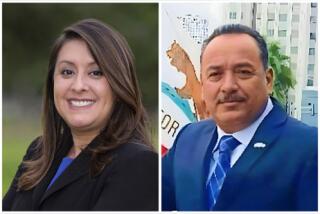Term Limit May Mean ’96 Political Upheaval in Valley
State Sen. Ed Davis (R-Santa Clarita) contemplated retirement and spending more time on his golf game.
Assemblywoman Paula Boland (R-Granada Hills) thought about selling real estate again.
And fellow state lawmakers representing the San Fernando Valley and nearby areas gave renewed consideration Thursday to running for other offices from mayor to Congress in the wake of the state Supreme Court decision upholding voter-approved limits on the number of terms they can serve.
Meanwhile, local campaign consultants predicted the political equivalent of a land rush when term limits force most legislators from office in 1996, as a horde of candidates compete for freshly vacated Assembly and Senate seats.
“There’s going to be more candidates out there than flies at a picnic,” Republican political consultant Paul Clarke said. “And each fly is going to have a political consultant and a pollster.”
In a 6-1 ruling, the state high court held that Proposition 140, passed by voters in November, does not unduly restrict a lawmaker’s right to run for office or a voter’s right to choose a candidate. The proposition limits Assembly members to three two-year terms and senators to two four-year terms.
Chief Justice Malcolm Lucas said in the court’s majority opinion that any curtailment of legislators’ careers is outweighed by the state’s interest in “protecting against an entrenched, dynastic legislative bureaucracy.”
Political consultants familiar with the San Fernando Valley area said that long before 1996, many state politicians will begin scrambling to move into other elected jobs.
Several local legislators have already begun planning to bail out of their current positions. State Assemblyman Richard Katz (D-Sylmar), for example, is expected to run for Los Angeles mayor in 1993.
Clarke said voters may be treated to an unusual spectacle in 1996: A host of well-financed state legislators battling each another for a relative handful of jobs at other levels of government, while legions of lesser-known and under-financed candidates race to fill their slots in Sacramento.
Davis, who has been in the Senate since 1980 and voted against Proposition 140, said he probably will simply retire in 1996, when he will be 80 years old.
“The worst criticism I have of this job is that there’s no way you can play an 18-hole game of golf,” he said only half jokingly, citing a heavy workload and time pressures.
Boland, a first-term assemblywoman who backed term limits, said she intends to stay in the Legislature until 1996 but then probably will return to the real estate business. Boland said she sold her real estate brokerage this year to avoid any conflict of interest with her state duties.
“I was a businesswoman for 30 years. Am I going to fall apart at the thought that I’m not going to be in the Assembly in five years? Certainly not,” she said.
Assemblyman Tom Bane (D-Van Nuys)--who with 23 years in the Legislature is the longest-serving Valley incumbent--said he wants to stay in politics but is thinking about changing roles and becoming a campaign consultant.
As with other legislators, Bane said that whether he runs for reelection next year will depend in part on how his district is reshaped during the once-a-decade remapping of legislative and congressional districts. The state Supreme Court recently appointed three special masters to redraw the boundaries after Gov. Pete Wilson vetoed plans presented by the Legislature.
Bane, who opposed Proposition 140, said he was unhappy at the court ruling because it will damage the quality of the Legislature by bringing in “uninformed and really unprepared legislators.”
Assemblyman Terry B. Friedman (D-Los Angeles), another Proposition 140 opponent, called the court decision “a defeat for democracy.”
“I think it takes away from people their right to choose who they want to represent them, and I think it will lead to greater power by the big corporate special interests as the Legislature is filled by more inexperienced members,” said Friedman, who represents portions of the South Valley.
Friedman, who was first elected in 1986, said he continues to have an interest in running for Los Angeles city attorney if the job becomes vacant, or possibly some other local office.
Sen. Gary Hart (D-Santa Barbara), who represents a sliver of the West Valley, said that “rather than wringing hands” over the decision, legislators “ought to start living under it.”
Hart, who is likely to run for Congress next year, said he wants to ensure that the Legislature continues to counterbalance the governor’s power. He said, for instance, he would fight to maintain the legislative analyst’s office, which reviews fiscal issues for lawmakers.
RELATED STORY: A1
More to Read
Sign up for Essential California
The most important California stories and recommendations in your inbox every morning.
You may occasionally receive promotional content from the Los Angeles Times.










